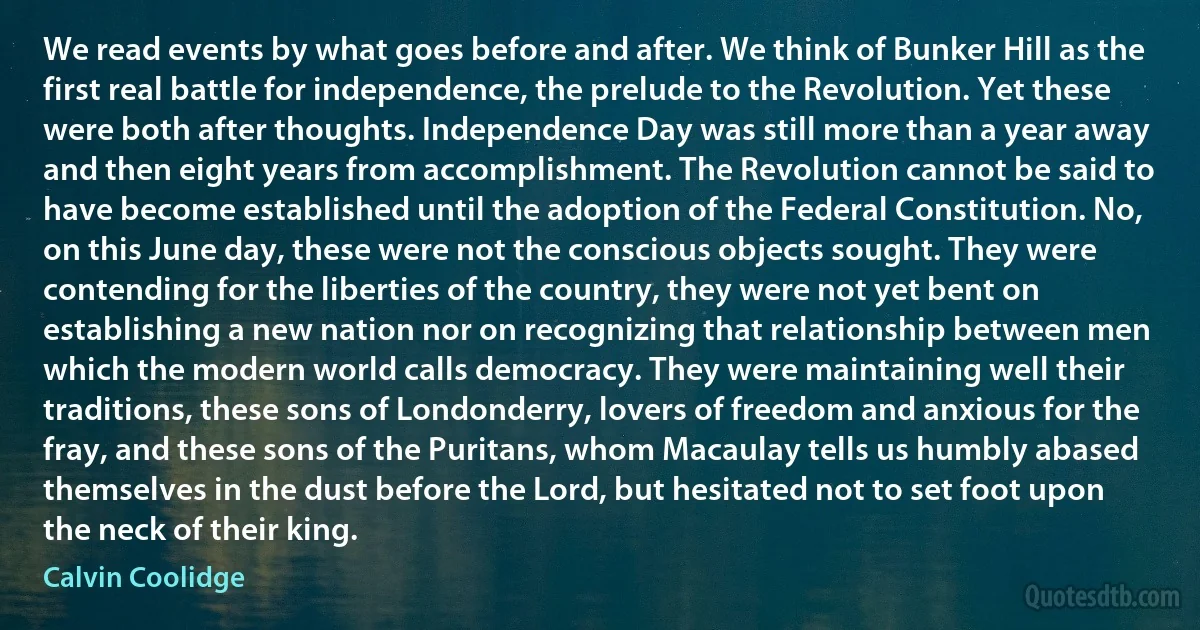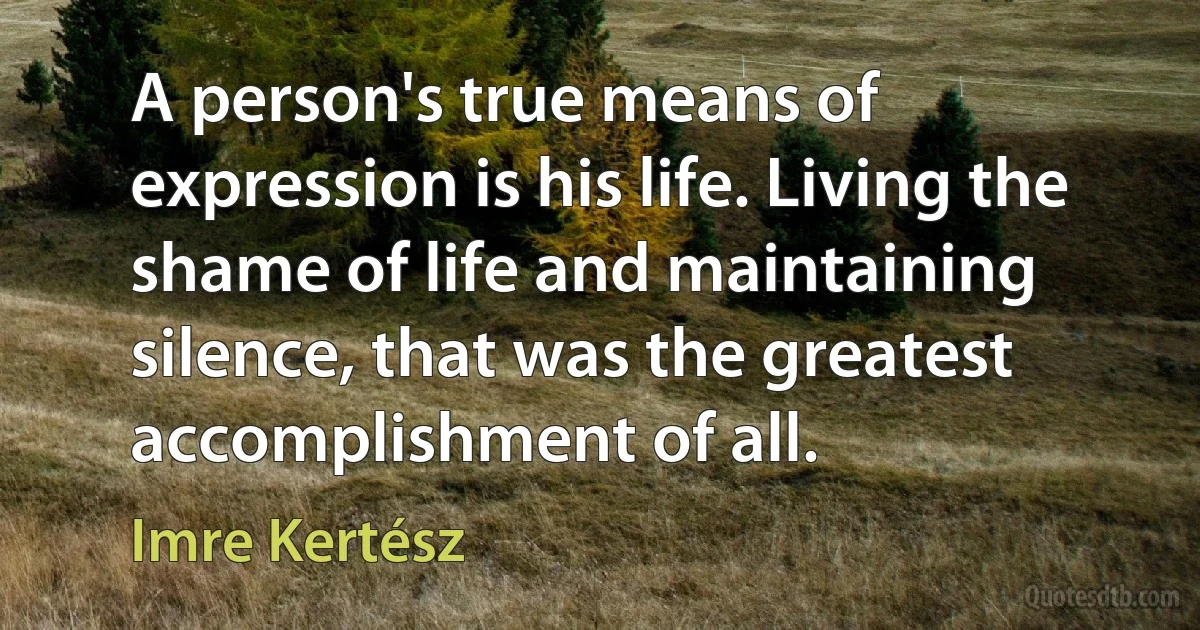Maintaining Quotes - page 5
While it is true that we are paying out far more money and maintaining a much stronger Military Establishment than ever before, because of the conditions stated, we have been able to pursue a moderate course. Our people have had all the war, all the taxation, and all the military service that they want. They have therefore wished to emphasize their attachment to our ancient policy of peace. They have insisted upon economy. They have supported the principle of limitation of armaments. They have been able to do this because of their position and their strength in numbers and in resources. We have a tremendous natural power which supplements our arms. We are conscious that no other nation harbors any design to put us in jeopardy.

Calvin Coolidge
The progress of human knowledge depends on maintaining that touch of scepticism even about the most "unquestionable" truths. A century ago, Darwin's theory of evolution by natural selection was regarded as scientifically unshakeable; today, most biologists have their reservations about it. Fifty years ago, Freud's sexual theory of neurosis was accepted by most psychiatrists; today, it is widely recognized that his methods were highly questionable. At the turn of this century, a scientist who questioned Newton's theory of gravity would have been regarded as insane; twenty years later, it had been supplanted by Einstein's theory, although, significantly, few people actually understood it. It seems perfectly conceivable that our descendants of the twenty-second century will wonder how any of us could have been stupid enough to have been taken in by Darwin, Freud or Einstein.

Colin Wilson
André Weil suggested that there is a logarithmic law at work: first-rate people attract other first-rate people, but second-rate people tend to hire third-raters, and third-rate people hire fifth-raters. If a dean or a president is genuinely interested in building and maintaining a high-quality university (and some of them are), then he must not grant complete self-determination to a second-rate department; he must, instead, use his administrative powers to intervene and set things right. That's one of the proper functions of deans and presidents, and pity the poor university in which a large proportion of both the faculty and the administration are second-raters; it is doomed to diverge to minus infinity.

Paul Halmos
Maintaining a rotten economic system has nothing to do with nationalism, which is an affirmation of the Fatherland. I can love Germany and hate capitalism. Not only can I, I must. Only the annihilation of a system of exploitation carries with it the core of the rebirth of our people.

Joseph Goebbels
The faith in the nation is a matter for everyone, never a group, a class or an economic clique. The eternal must be distinguished from the temporal. Maintaining a rotten economic system has nothing to do with nationalism, which is an affirmation of the Fatherland. I can love Germany and hate capitalism. Not only can I, I must. Only the annihilation of a system of exploitation carries with it the core of the rebirth of our people.

Joseph Goebbels
The people's community must not be a mere phrase, but a revolutionary achievement following from the radical carrying out of the basic life needs of the working class. A ruthless battle against corruption! A war against exploitation, freedom for the workers! The elimination of all economic-capitalist influences on national policy. Maintaining a rotten economic system has nothing to do with nationalism, which is an affirmation of the Fatherland... The sin of liberal thinking was to overlook socialism's nation-building strengths, thereby allowing its energies to go in anti-national directions.

Joseph Goebbels
When has the world seen a phenomenon like this? a lonely uninstructed youth, coming from amid the moral darkness of Galilee, even more distinct from His age, and from every thing around Him, than a Plato would be rising up in some wild tribe in Oregon, assuming thus a position at the head of the world and maintaining it, for eighteen centuries, by the pure self-evidence of His life and doctrine.

Horace Bushnell
The Slav is never able to build anything himself. In the long run, he's not capable of it. I'll come back to this later. With the exception of a few phenomena produced by Asia every couple of centuries, through that mixture of two heredities which may be fortunate for Asia but is unfortunate for us Europeans - with the exception, therefore, of an Attilla, a Ghenghis Khan, a Tamerlaine, a Lenin, a Stalin - the mixed race of the Slavs is based on a sub-race with a few drops of blood of our blood, blood of a leading race; the Slav is unable to control himself and create order. He is able to argue, able to debate, able to disintegrate, able to offer resistance against every authority and to revolt. But these human shoddy goods are just as incapable of maintaining order today as they were 700 or 800 years ago, when they called in the Varangians, when they called in the Ruriks.

Heinrich Himmler
If you reject absolutely any single sensation without stopping to discriminate with respect to that which awaits confirmation between matter of opinion and that which is already present, whether in sensation or in feelings or in any immediate perception of the mind, you will throw into confusion even the rest of your sensations by your groundless belief and so you will be rejecting the standard of truth altogether. If in your ideas based upon opinion you hastily affirm as true all that awaits confirmation as well as that which does not, you will not escape error, as you will be maintaining complete ambiguity whenever it is a case of judging between right and wrong opinion. (24)

Epicurus
There are two levels of knowing a subject. There is the student who knows what the definition of a noun or a gene or a molecule is; then there is the student... who also knows how the definition was arrived at. There is the student who can answer a question; then there is the student who also knows what are the biases of the question. There is the student who can give you the facts; then there is the student who also knows what is meant by a fact. I am maintaining that, in all cases, it is the latter who has a "basic" education; the former, a frivolous one.

Neil Postman
Under our constitutional system, courts stand against any winds that blow as havens of refuge for those who might otherwise suffer because they are helpless, weak, outnumbered, or because they are non-conforming victims of prejudice and public excitement...No higher duty, or more solemn responsibility rests upon this Court than that of translating into living law and maintaining this constitutional shield deliberately planned and inscribed for the benefit of every human being subject to our Constitution - of whatever race, creed, or persuasion.

Hugo Black
An illness is a failure to solve a mental or psychological problem in the correct manner . . . The energy that would be used to solve the problem instead is spent maintaining the illness. It is therefore necessary that an attempt be made as soon as possible to solve the problem, which of course must first be discovered by the ego, which has avoided it.

Robert Butts
This 'God of Jane' idea, or 'God of Jim' or whoever, suits me in many ways. It suggests an intensely personal connection between each individual and the universe, for one thing. For another, it makes important distinctions between the private 'God' and the universal All That Is, while still maintaining the personal involvement. For instance, when I use the phrase 'the God of Jane', I'm referring to or trying to contact the portion of the universe that is forming me -- that is turning some indefinable divinity into this living temporal flesh. I want to avoid all other complications. I'm not trying to contact the God of Abraham, for instance, or the Biblical Christ, or the inexplicable power behind all of reality.

Robert Butts
The widespread use of the market reduces the strain on the social fabric by rendering conformity unnecessary with respect to any activities it encompasses. The wider the range of activities covered by the market, the fewer are the issues on which explicitly political decisions are required and hence on which it is necessary to achieve agreement. In turn, the fewer the issues on which agreement is necessary, the greater is the likelihood of getting agreement while maintaining a free society.

Milton Friedman
Not long after his (Justinian) accession, he reaffirmed the penalties which previous Emperors had enacted against the pagans, and forbade all donations or legacies for the purpose of maintaining "Hellenic impiety,"... by making the profession of (Christian) orthodoxy a necessary condition for public teaching Justinian accelerated the extinction of "Hellenism."... This event had a curious sequel. Some of the philosophers whose occupation was gone resolved to cast the dust of the Christian Empire from their feet and migrate.

J. B. Bury
Sir,
Would you allow me, grateful as I am for the kind reception you once extended to me, to show my concern about maintaining your well-deserved prestige and to point out that your star which, until now, has shone so brightly, risks being dimmed by the most shameful and indelible of stains?

Émile Zola
As a matter of general principle, I believe there can be no doubt that criticism in time of war is essential to the maintenance of any kind of democratic government ... too many people desire to suppress criticism simply because they think that it will give some comfort to the enemy to know that there is such criticism. If that comfort makes the enemy feel better for a few moments, they are welcome to it as far as I am concerned, because the maintenance of the right of criticism in the long run will do the country maintaining it a great deal more good than it will do the enemy, and will prevent mistakes which might otherwise occur.

Robert A. Taft
...The relationship of a people to their homeland is crucial. A people will naturally have a difficult time maintaining a common cultural identity without a collective presence in their homeland. Only in its homeland can a people develop economically, culturally and socially as a homogeneous entity. In fact, this is the crux of why some of us consider it necessary to struggle to live in our homeland.

Monte Melkonian



